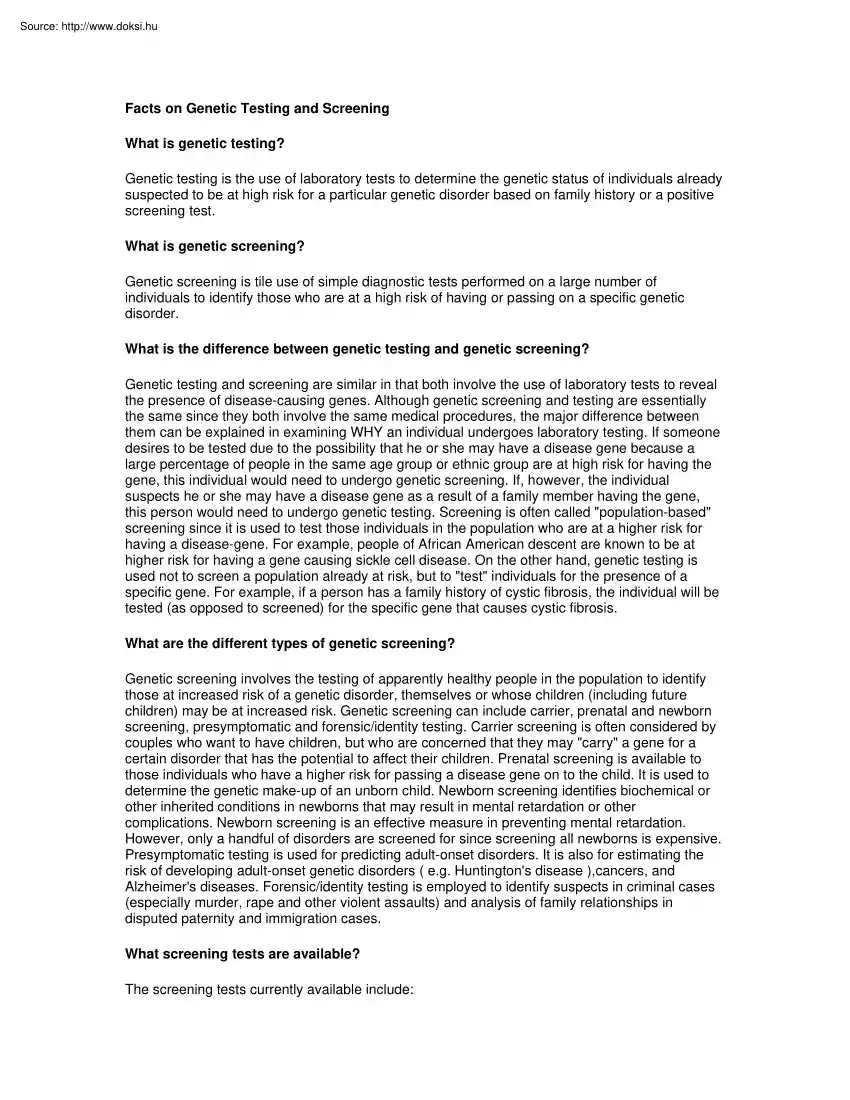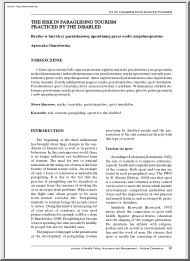Please log in to read this in our online viewer!

Please log in to read this in our online viewer!
No comments yet. You can be the first!
What did others read after this?
Content extract
Facts on Genetic Testing and Screening What is genetic testing? Genetic testing is the use of laboratory tests to determine the genetic status of individuals already suspected to be at high risk for a particular genetic disorder based on family history or a positive screening test. What is genetic screening? Genetic screening is tile use of simple diagnostic tests performed on a large number of individuals to identify those who are at a high risk of having or passing on a specific genetic disorder. What is the difference between genetic testing and genetic screening? Genetic testing and screening are similar in that both involve the use of laboratory tests to reveal the presence of disease-causing genes. Although genetic screening and testing are essentially the same since they both involve the same medical procedures, the major difference between them can be explained in examining WHY an individual undergoes laboratory testing. If someone desires to be tested due to the possibility
that he or she may have a disease gene because a large percentage of people in the same age group or ethnic group are at high risk for having the gene, this individual would need to undergo genetic screening. If, however, the individual suspects he or she may have a disease gene as a result of a family member having the gene, this person would need to undergo genetic testing. Screening is often called "population-based" screening since it is used to test those individuals in the population who are at a higher risk for having a disease-gene. For example, people of African American descent are known to be at higher risk for having a gene causing sickle cell disease. On the other hand, genetic testing is used not to screen a population already at risk, but to "test" individuals for the presence of a specific gene. For example, if a person has a family history of cystic fibrosis, the individual will be tested (as opposed to screened) for the specific gene that causes
cystic fibrosis. What are the different types of genetic screening? Genetic screening involves the testing of apparently healthy people in the population to identify those at increased risk of a genetic disorder, themselves or whose children (including future children) may be at increased risk. Genetic screening can include carrier, prenatal and newborn screening, presymptomatic and forensic/identity testing. Carrier screening is often considered by couples who want to have children, but who are concerned that they may "carry" a gene for a certain disorder that has the potential to affect their children. Prenatal screening is available to those individuals who have a higher risk for passing a disease gene on to the child. It is used to determine the genetic make-up of an unborn child. Newborn screening identifies biochemical or other inherited conditions in newborns that may result in mental retardation or other complications. Newborn screening is an effective measure in
preventing mental retardation However, only a handful of disorders are screened for since screening all newborns is expensive. Presymptomatic testing is used for predicting adult-onset disorders. It is also for estimating the risk of developing adult-onset genetic disorders ( e.g Huntington's disease ),cancers, and Alzheimer's diseases. Forensic/identity testing is employed to identify suspects in criminal cases (especially murder, rape and other violent assaults) and analysis of family relationships in disputed paternity and immigration cases. What screening tests are available? The screening tests currently available include: • • • • Chronic villus sampling (CVS) - usually done at 10 to 12 weeks of pregnancy to obtain a sample of the placenta by passing a plastic tube through the vagina and into the uterus or by passing a needle through the abdomen and into the uterus. This allows doctors to diagnose many of the same conditions as amniocente- sis, but earlier
in the pregnancy. blood test for alpha-fetoprotein (AFP) -may be performed at 16 to 18 weeks of pregnancy and is used to indicate the level of AFP , a substance produced by the foetus and passed to the mother's blood. Amniocentesis may be done at 13 to 18 weeks of pregnancy and is a widely-used procedure of obtaining amniotic fluid from the uterus by using a needle to pass through the abdomen. Ultrasound - usually performed as early as possible in pregnancy, and is a non-invasive procedure that provides a visual image of the foetus. Embryo biopsy can be used on an embryo conceived by in vitro fertilization to determine if the embryo is free of certain genetic disorders before it is implanted in the uterus. What is done in a gene test? In gene tests, scientists scan a patient's DNA sample for mutated sequences. A DNA sample can be obtained from any tissue, including blood. For some types of gene tests, researchers design short pieces of DNA called probes, whose sequences are
complementary to the mutated sequences. These probes will seek their complement among the three billion base pairs of an individual's genome. If the mutated sequence is present in the patient's genome, the probe will bind to it and flag the mutation. Another type of DNA testing involves comparing the sequence of DNA bases in a patient's gene to a normal version of the gene. Cost of testing depends on the sizes of the genes and the numbers of mutations tested. Who can benefit from genetic testing and screening? • • • • • • • those who are concerned that they may have a genetic or chromosomal disorder because of a specific condition in their families couples who already have a child with a genetic disorder, unexplained mental retardation or a birth defect women who have had two or more miscarriages or whose baby dies in infancy women who deliver a child after age 35 couples who would like testing or information about genetic disorders that occur frequently
in their ethnic group pregnant women concerned about the effects of exposure to medication, chemicals or radiation couples who are first cousins or other blood relatives. What are the advantages and disadvantages of genetic testing? Genetic testing can cause either a feeling of relief or anxiety, depending on the outcome of the test results. Ultimately, testing provides individuals with an opportunity to seek genetic counselling so that the risk of inheriting a genetic disease may be reduced. Testing can lessen the anxiety of not knowing the possibility of developing a disease and provide a tremendous sense of relief once a definitive test result is given. An individual who chooses to undergo testing has the opportunity to seek medical help, prepare for, and possibly help prevent, a genetically caused condition. Testing can help people to make more informed decisions about their future Unfortunately, several negative consequences may result from genetic testing as well. Once a
person has tested positive for a disease or condition, he or she risks stigmatization, loss of health or life insurance, loss of employment or educational opportunities and possibly can lose the ability to adopt a child. Privacy of other family members is threatened since, if one family member is tested, this information implies that relatives also could have the disease gene or may have an increased risk for disease. Another problem of genetic testing is the inability to predict the severity number of unique factors. Even couples who choose prenatal testing cannot always know in advance the severity of the disability in their child. What is happening in Ireland? The National Centre for Medical Genetics is located in Our Lady's Hospital, Crumlin ,Dublin. The centre has two laboratories which carry out genetic testing. One of these laboratories uses chromosome testing for identifying genetic disorders, such as Down's syndrome. The other, a molecular laboratory, uses DNA
testing to detect cystic fibrosis and muscular dystrophy. Approximately 7,000 to 8,000 tests are run by this centre per year in which about 2,000 people may be tested. The tests are run in response to requests from families or doctors There are genetic doctors based in Galway, Limerick and Cork. But all blood samples are sent to Crumlin The Temple Street Children's Hospital, Dublin is responsible for the 'heel prick test' which screens for four different metabolic disorders, namely, PKU (phenylketonuria), galactosemia, homocystinuria, maple syrup urine disease. In addition this test also screens for the congenital disorder , hypothyroidism. All new born babies receive this test The hospital hopes to screen for cystic fibrosis by the end of the year 2002. • • • • • Consequences of genetic screening Positive consequences Negative Consequences genetic screening will help recognise • invasion of personal privacy genetic defects • screening may lead to high
anxiety some diseases are treatable as a result of • there is no guarantee that all tests are screening 100% accurate screening will identify significant • screening will lead to "selection" of traits complications during pregnancy wanted by the parents, not just the may be able to prevent premature death elimination of disease it will identify those who are at a high risk of having or passing on a specific disorder Key Points on Genetic Testing • • • • • • Everyone may not need genetic testing, but those with a history of genetic disorders within the family should consider testing. Genetic screening and testing has both positive and negative consequences. It's important to weigh the advantages and disadvantages when considering genetic screening or testing . The value of genetic testing depends on several factors: the accuracy of the test, the reliability of the interpretation of the results, the ability to treat the condition and the quality of
genetic counselling available. Genetic tests can provide medical information that affects the entire family. Testing has implications for future reproductive decisions, usually providing a probability of disease, rather than predicting future "diagnoses." • • • Reliable genetic tests can predict the chance of having a disease gene with high accuracy. However, not everyone with a disease gene may go on to develop a disease or condition due to possible effects of other genes or environmental factors. Informed consent, the communication of information between a patient and health care provider about a genetic test, can be an important component of genetic testing, yet there are no national standards to guide health care providers on how this information should be given. Although physicians have not agreed on standards for the testing of children, some experts think that testing should be conducted only when there is clear benefit to the child. Others feel that
testing should also be considered if it can benefit other family members. Genetic conditions Some of the 4,000 known genetic conditions. Mendellan conditions (recessive, dominant and Xlinked) follow a clear pattern of Inheritance, whereas it is less easy or impossible to predict the occurrence of sporadic and multifactorial conditions. Mode of Infection Disease/Condition Main features Time of onset of symptoms Sporadic Down's syndrome Range of mental retardation. etc Birth Kilnefelter's syndrome Defect in sexual differentiation Birth Cystic fibrosis Wide range of complications due to excessively thick mucus secretion especially in the lungs/ digestive system 1-2 years Sickle cell anaemia Chronic anaemia/infections/painful or haemolytic crises 6 months onwards Autosomal recessive Tay-Sashes disease Deafness/blandness/seizures/Spasticity 3-6 months Autosomal dominant Thalassaemias Severe anaemia/ skeletal deformity Six months Onwards Familial
hyperCholesterolaemia High cholesterol level leads to early coronary heart disease 20-30 yeas X-linked Huntingdon’s disease Involuntary movements/ dementia 35-45 years Polycystic kidney Disease Cysts in liver/pancreas/spleen/kidney 40-60 years Haemophilia’s Failure of blood to clot. bruising and excessive bleeding after injury 1 year onwards Duchess muscular Dystrophy Muscle wasting 1-3 years Lesch - Nyhan syndrome Mental retardation/ self-mutilation Birth Difficulty breathing Birth Multifactodal (often with a high genetic Asthma contribution) Coronary heart disease What Genetic Professionals Do (Genetic Counsellors, Clinical Geneticists, etc) Arteries become narrowed, can lead to Middle age heart failure How They Do It 33% of people referred for genetic counselling have other genetic issues in their families that need to be addressed. These issues are identified by taking a detailed family history. The family history of genetic disorders and Separate
the genetic from the non-genetic issues in the birth defects is analyzed. family history to avoid unnecessary testing. Genetic counsellors assess and interpret The risk for a genetic condition to occur or recur must be the risk for occurrence or recurrence of explained with total accuracy. genetic conditions in the family. People need to understand the meaning of a diagnosis The nature of the condition(s), including (range of severity) and how it is inherited to be able to the process of inheritance, is carefully make a decision about whether they want to be tested discussed. and whether they want their unborn child tested. Options available to reduce recurrence Many options are available to people at risk for a genetic risk(s) and specific genetic testing disease, such as carrier screening, adoption, egg/sperm currently available is discussed. donation and prenatal testing. A family history or pedigree including all medical problems is constructed. The risks and benefits of each
option is discussed with careful attention being given to the individual's level of understanding. Assist in selecting the option appropriate for an individual or family. Each option has risks, benefits, and limitations that individuals need to Understand in order to choose the option appropriate for them. Much of the information provided can be confusing. Assisting individuals with decision-making requires good Supportive counselling and/or referrals to counselling skills and a non-directive approach. Genetic community resources are provided when coW1sellors often refer individuals to other health care appropriate. professionals or family support groups when necessary. Genetic testing is sometimes complex and involves The genetic tests performed are obtaining screening test results and documenting the coordinated, when indicated. correct diagnosis. A summary letter documenting the Documenting the counselling session ensures an counselling session and an outline of the accurate
record for the patient and physician. It becomes plan of care is sent to the one tested and a medical-legal document for the patient chart. the referring physician. What Do you Think? Once it becomes possible to test quickly and reliably for thousands of genetic conditions, should doctors be expected to perform such tests? Should the doctor be liable for failing to test or for failing to inform parents of every detail of the test result? Who should counsel patients about what their genetic blueprints mean and how will people react to their particular genetic makeup? Do health and life insurers who deny policies to people with disease genes have the right to do so? Should laws be passed to protect people against genetic discrimination? How can genetic information be kept confidential and how can the discriminatory use of test results be prevented? Since some tests will reveal information about other family members, can the privacy of these relatives be protected? Do people have the
right to choose not to know about their genes? Do mothers have the right to choose not to have their foetuses tested? Taken from Genetic Screening and Ethics: An Overview. The Woodrow Wilson Biology Institute, 1992, David Devore
that he or she may have a disease gene because a large percentage of people in the same age group or ethnic group are at high risk for having the gene, this individual would need to undergo genetic screening. If, however, the individual suspects he or she may have a disease gene as a result of a family member having the gene, this person would need to undergo genetic testing. Screening is often called "population-based" screening since it is used to test those individuals in the population who are at a higher risk for having a disease-gene. For example, people of African American descent are known to be at higher risk for having a gene causing sickle cell disease. On the other hand, genetic testing is used not to screen a population already at risk, but to "test" individuals for the presence of a specific gene. For example, if a person has a family history of cystic fibrosis, the individual will be tested (as opposed to screened) for the specific gene that causes
cystic fibrosis. What are the different types of genetic screening? Genetic screening involves the testing of apparently healthy people in the population to identify those at increased risk of a genetic disorder, themselves or whose children (including future children) may be at increased risk. Genetic screening can include carrier, prenatal and newborn screening, presymptomatic and forensic/identity testing. Carrier screening is often considered by couples who want to have children, but who are concerned that they may "carry" a gene for a certain disorder that has the potential to affect their children. Prenatal screening is available to those individuals who have a higher risk for passing a disease gene on to the child. It is used to determine the genetic make-up of an unborn child. Newborn screening identifies biochemical or other inherited conditions in newborns that may result in mental retardation or other complications. Newborn screening is an effective measure in
preventing mental retardation However, only a handful of disorders are screened for since screening all newborns is expensive. Presymptomatic testing is used for predicting adult-onset disorders. It is also for estimating the risk of developing adult-onset genetic disorders ( e.g Huntington's disease ),cancers, and Alzheimer's diseases. Forensic/identity testing is employed to identify suspects in criminal cases (especially murder, rape and other violent assaults) and analysis of family relationships in disputed paternity and immigration cases. What screening tests are available? The screening tests currently available include: • • • • Chronic villus sampling (CVS) - usually done at 10 to 12 weeks of pregnancy to obtain a sample of the placenta by passing a plastic tube through the vagina and into the uterus or by passing a needle through the abdomen and into the uterus. This allows doctors to diagnose many of the same conditions as amniocente- sis, but earlier
in the pregnancy. blood test for alpha-fetoprotein (AFP) -may be performed at 16 to 18 weeks of pregnancy and is used to indicate the level of AFP , a substance produced by the foetus and passed to the mother's blood. Amniocentesis may be done at 13 to 18 weeks of pregnancy and is a widely-used procedure of obtaining amniotic fluid from the uterus by using a needle to pass through the abdomen. Ultrasound - usually performed as early as possible in pregnancy, and is a non-invasive procedure that provides a visual image of the foetus. Embryo biopsy can be used on an embryo conceived by in vitro fertilization to determine if the embryo is free of certain genetic disorders before it is implanted in the uterus. What is done in a gene test? In gene tests, scientists scan a patient's DNA sample for mutated sequences. A DNA sample can be obtained from any tissue, including blood. For some types of gene tests, researchers design short pieces of DNA called probes, whose sequences are
complementary to the mutated sequences. These probes will seek their complement among the three billion base pairs of an individual's genome. If the mutated sequence is present in the patient's genome, the probe will bind to it and flag the mutation. Another type of DNA testing involves comparing the sequence of DNA bases in a patient's gene to a normal version of the gene. Cost of testing depends on the sizes of the genes and the numbers of mutations tested. Who can benefit from genetic testing and screening? • • • • • • • those who are concerned that they may have a genetic or chromosomal disorder because of a specific condition in their families couples who already have a child with a genetic disorder, unexplained mental retardation or a birth defect women who have had two or more miscarriages or whose baby dies in infancy women who deliver a child after age 35 couples who would like testing or information about genetic disorders that occur frequently
in their ethnic group pregnant women concerned about the effects of exposure to medication, chemicals or radiation couples who are first cousins or other blood relatives. What are the advantages and disadvantages of genetic testing? Genetic testing can cause either a feeling of relief or anxiety, depending on the outcome of the test results. Ultimately, testing provides individuals with an opportunity to seek genetic counselling so that the risk of inheriting a genetic disease may be reduced. Testing can lessen the anxiety of not knowing the possibility of developing a disease and provide a tremendous sense of relief once a definitive test result is given. An individual who chooses to undergo testing has the opportunity to seek medical help, prepare for, and possibly help prevent, a genetically caused condition. Testing can help people to make more informed decisions about their future Unfortunately, several negative consequences may result from genetic testing as well. Once a
person has tested positive for a disease or condition, he or she risks stigmatization, loss of health or life insurance, loss of employment or educational opportunities and possibly can lose the ability to adopt a child. Privacy of other family members is threatened since, if one family member is tested, this information implies that relatives also could have the disease gene or may have an increased risk for disease. Another problem of genetic testing is the inability to predict the severity number of unique factors. Even couples who choose prenatal testing cannot always know in advance the severity of the disability in their child. What is happening in Ireland? The National Centre for Medical Genetics is located in Our Lady's Hospital, Crumlin ,Dublin. The centre has two laboratories which carry out genetic testing. One of these laboratories uses chromosome testing for identifying genetic disorders, such as Down's syndrome. The other, a molecular laboratory, uses DNA
testing to detect cystic fibrosis and muscular dystrophy. Approximately 7,000 to 8,000 tests are run by this centre per year in which about 2,000 people may be tested. The tests are run in response to requests from families or doctors There are genetic doctors based in Galway, Limerick and Cork. But all blood samples are sent to Crumlin The Temple Street Children's Hospital, Dublin is responsible for the 'heel prick test' which screens for four different metabolic disorders, namely, PKU (phenylketonuria), galactosemia, homocystinuria, maple syrup urine disease. In addition this test also screens for the congenital disorder , hypothyroidism. All new born babies receive this test The hospital hopes to screen for cystic fibrosis by the end of the year 2002. • • • • • Consequences of genetic screening Positive consequences Negative Consequences genetic screening will help recognise • invasion of personal privacy genetic defects • screening may lead to high
anxiety some diseases are treatable as a result of • there is no guarantee that all tests are screening 100% accurate screening will identify significant • screening will lead to "selection" of traits complications during pregnancy wanted by the parents, not just the may be able to prevent premature death elimination of disease it will identify those who are at a high risk of having or passing on a specific disorder Key Points on Genetic Testing • • • • • • Everyone may not need genetic testing, but those with a history of genetic disorders within the family should consider testing. Genetic screening and testing has both positive and negative consequences. It's important to weigh the advantages and disadvantages when considering genetic screening or testing . The value of genetic testing depends on several factors: the accuracy of the test, the reliability of the interpretation of the results, the ability to treat the condition and the quality of
genetic counselling available. Genetic tests can provide medical information that affects the entire family. Testing has implications for future reproductive decisions, usually providing a probability of disease, rather than predicting future "diagnoses." • • • Reliable genetic tests can predict the chance of having a disease gene with high accuracy. However, not everyone with a disease gene may go on to develop a disease or condition due to possible effects of other genes or environmental factors. Informed consent, the communication of information between a patient and health care provider about a genetic test, can be an important component of genetic testing, yet there are no national standards to guide health care providers on how this information should be given. Although physicians have not agreed on standards for the testing of children, some experts think that testing should be conducted only when there is clear benefit to the child. Others feel that
testing should also be considered if it can benefit other family members. Genetic conditions Some of the 4,000 known genetic conditions. Mendellan conditions (recessive, dominant and Xlinked) follow a clear pattern of Inheritance, whereas it is less easy or impossible to predict the occurrence of sporadic and multifactorial conditions. Mode of Infection Disease/Condition Main features Time of onset of symptoms Sporadic Down's syndrome Range of mental retardation. etc Birth Kilnefelter's syndrome Defect in sexual differentiation Birth Cystic fibrosis Wide range of complications due to excessively thick mucus secretion especially in the lungs/ digestive system 1-2 years Sickle cell anaemia Chronic anaemia/infections/painful or haemolytic crises 6 months onwards Autosomal recessive Tay-Sashes disease Deafness/blandness/seizures/Spasticity 3-6 months Autosomal dominant Thalassaemias Severe anaemia/ skeletal deformity Six months Onwards Familial
hyperCholesterolaemia High cholesterol level leads to early coronary heart disease 20-30 yeas X-linked Huntingdon’s disease Involuntary movements/ dementia 35-45 years Polycystic kidney Disease Cysts in liver/pancreas/spleen/kidney 40-60 years Haemophilia’s Failure of blood to clot. bruising and excessive bleeding after injury 1 year onwards Duchess muscular Dystrophy Muscle wasting 1-3 years Lesch - Nyhan syndrome Mental retardation/ self-mutilation Birth Difficulty breathing Birth Multifactodal (often with a high genetic Asthma contribution) Coronary heart disease What Genetic Professionals Do (Genetic Counsellors, Clinical Geneticists, etc) Arteries become narrowed, can lead to Middle age heart failure How They Do It 33% of people referred for genetic counselling have other genetic issues in their families that need to be addressed. These issues are identified by taking a detailed family history. The family history of genetic disorders and Separate
the genetic from the non-genetic issues in the birth defects is analyzed. family history to avoid unnecessary testing. Genetic counsellors assess and interpret The risk for a genetic condition to occur or recur must be the risk for occurrence or recurrence of explained with total accuracy. genetic conditions in the family. People need to understand the meaning of a diagnosis The nature of the condition(s), including (range of severity) and how it is inherited to be able to the process of inheritance, is carefully make a decision about whether they want to be tested discussed. and whether they want their unborn child tested. Options available to reduce recurrence Many options are available to people at risk for a genetic risk(s) and specific genetic testing disease, such as carrier screening, adoption, egg/sperm currently available is discussed. donation and prenatal testing. A family history or pedigree including all medical problems is constructed. The risks and benefits of each
option is discussed with careful attention being given to the individual's level of understanding. Assist in selecting the option appropriate for an individual or family. Each option has risks, benefits, and limitations that individuals need to Understand in order to choose the option appropriate for them. Much of the information provided can be confusing. Assisting individuals with decision-making requires good Supportive counselling and/or referrals to counselling skills and a non-directive approach. Genetic community resources are provided when coW1sellors often refer individuals to other health care appropriate. professionals or family support groups when necessary. Genetic testing is sometimes complex and involves The genetic tests performed are obtaining screening test results and documenting the coordinated, when indicated. correct diagnosis. A summary letter documenting the Documenting the counselling session ensures an counselling session and an outline of the accurate
record for the patient and physician. It becomes plan of care is sent to the one tested and a medical-legal document for the patient chart. the referring physician. What Do you Think? Once it becomes possible to test quickly and reliably for thousands of genetic conditions, should doctors be expected to perform such tests? Should the doctor be liable for failing to test or for failing to inform parents of every detail of the test result? Who should counsel patients about what their genetic blueprints mean and how will people react to their particular genetic makeup? Do health and life insurers who deny policies to people with disease genes have the right to do so? Should laws be passed to protect people against genetic discrimination? How can genetic information be kept confidential and how can the discriminatory use of test results be prevented? Since some tests will reveal information about other family members, can the privacy of these relatives be protected? Do people have the
right to choose not to know about their genes? Do mothers have the right to choose not to have their foetuses tested? Taken from Genetic Screening and Ethics: An Overview. The Woodrow Wilson Biology Institute, 1992, David Devore




